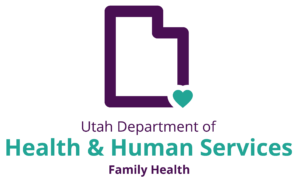In-home early intervention services for infants and toddlers
Easterseals-Goodwill offers early intervention services through our Provo Early Intervention Program for families with children under three with disabilities and/or developmental delays who live in the Provo school district.
If you have an infant or toddler with a disability, or you feel they may be experiencing delays in one or more of the following areas, the best time to seek help is NOW. Review the development milestones below to see how your child is progressing for their age based on:
Physical development
Vision and hearing
Feeding and dressing skills
Social and emotional development
Communication and language
Learning, problem solving and play skills
Does my child need early intervention?
If you suspect your child may be experiencing delays in their development, the first step is to arrange for a FREE comprehensive evaluation, conducted by our child development specialist. You don’t need a doctor’s referral, just let us know you’d like to have your child evaluated. We will set a time to visit your home, gather your concerns and priorities and conduct a comprehensive assessment.
If it’s determined that your child qualifies for early intervention services, we will work with your family collaboratively to develop an Individual Family Service Plan (IFSP) that will detail your families’ priorities, and outline a treatment plan in which we will work together to help your child reach their optimal development.
What does early intervention include?
Easterseals-Goodwill’s Provo Early Intervention Program provides a comprehensive set of early intervention services, specially tailored to the needs of your child. Our therapists and developmental specialists come to your home to provide services. Home is where your child is likely to feel most comfortable, and where it’s typically most convenient for your family. The early intervention services we provide include:
Physical therapy
Occupational therapy
Speech and language therapy
Hearing assessment
Psychological consultation
Nursing/health assessment
Parent training & education
Referral to community resources
We also provide ongoing guidance, support and education for your family about your child’s development, empowering you to better understand and meet your child’s unique needs.
What do early intervention services cost?
If your child qualifies for early intervention services, you may be charged a fee based on a sliding scale depending on your family’s size and income. If your child is enrolled in Medicaid, the cost of services may be covered by that program.
Typical Development Milestones
The following general guidelines can help you assess the development of your child, although each child’s rate of development varies.
NEWBORN
• Strong suckle
• Hand closes tight on contact
• Makes small throaty noises
• On stomach, lifts head
1-3 MONTHS
• Smiles in response to your smile
• Hands held open most of the time
• Looks at someone talking
• Special cry for hunger
• On stomach, pushes up on forearms

NEWBORN
• Strong suckle
• Hand closes tight on contact
• Makes small throaty noises
• On stomach, lifts head
1-3 MONTHS
• Smiles in response to your smile
• Hands held open most of the time
• Looks at someone talking
• Special cry for hunger
• On stomach, pushes up on forearms
NEWBORN
• Strong suckle
• Hand closes tight on contact
• Makes small throaty noises
• On stomach, lifts head
1-3 MONTHS
• Smiles in response to your smile
• Hands held open most of the time
• Looks at someone talking
• Special cry for hunger
• On stomach, pushes up on forearms

3-6 MONTHS
• Babbles during play
• Reaches for nearby toy
• Turns head freely to look around
• Puts both hands on bottle or breast while feeding
NEWBORN
• Strong suckle
• Hand closes tight on contact
• Makes small throaty noises
• On stomach, lifts head
1-3 MONTHS
• Smiles in response to your smile
• Hands held open most of the time
• Looks at someone talking
• Special cry for hunger
• On stomach, pushes up on forearms

6-9 MONTHS
• Recognizes two common objects when named
• Waves “Hi” and “Bye bye”
• Rolls over/Sits with support
• Transfers toy from hand to hand
• Turns head toward sounds
• Holds, sucks and bites crackers
NEWBORN
• Strong suckle
• Hand closes tight on contact
• Makes small throaty noises
• On stomach, lifts head
1-3 MONTHS
• Smiles in response to your smile
• Hands held open most of the time
• Looks at someone talking
• Special cry for hunger
• On stomach, pushes up on forearms

9-12 MONTHS
• Finger feeds
• Repeats action when adult laughs
• Flings objects
• Picks up objects with thumb and first finger
• Creeps / crawls
• Side steps holding onto furniture
NEWBORN
• Strong suckle
• Hand closes tight on contact
• Makes small throaty noises
• On stomach, lifts head
1-3 MONTHS
• Smiles in response to your smile
• Hands held open most of the time
• Looks at someone talking
• Special cry for hunger
• On stomach, pushes up on forearms

12-15 MONTHS
• Stops drooling
• Scribbles spontaneously
• Uses three to five words plus “Mama” or “Dada”
NEWBORN
• Strong suckle
• Hand closes tight on contact
• Makes small throaty noises
• On stomach, lifts head
1-3 MONTHS
• Smiles in response to your smile
• Hands held open most of the time
• Looks at someone talking
• Special cry for hunger
• On stomach, pushes up on forearms

15-18 MONTHS
• Uses spoon, spilling little
• Removes hat, socks
• Inserts object into small opening
• Points to eyes, nose, or mouth of a doll
• Uses words to make needs known
• Runs stiffly
NEWBORN
• Strong suckle
• Hand closes tight on contact
• Makes small throaty noises
• On stomach, lifts head
1-3 MONTHS
• Smiles in response to your smile
• Hands held open most of the time
• Looks at someone talking
• Special cry for hunger
• On stomach, pushes up on forearms

18-24 MONTHS
• Defends own possessions
• Turns thick pages of a book
• Imitates two and three words sentences
• Pulls toys, throws balls, and builds towers
• Drinks from a cup held with both hands
NEWBORN
• Strong suckle
• Hand closes tight on contact
• Makes small throaty noises
• On stomach, lifts head
1-3 MONTHS
• Smiles in response to your smile
• Hands held open most of the time
• Looks at someone talking
• Special cry for hunger
• On stomach, pushes up on forearms

24-30 MONTHS
• Washes and dries own hands
• Carries out two-part commands
• Walks up and down stairs holding on
• Says at least 50 words and uses pronouns
• Points to and names objects in a book
NEWBORN
• Strong suckle
• Hand closes tight on contact
• Makes small throaty noises
• On stomach, lifts head
1-3 MONTHS
• Smiles in response to your smile
• Hands held open most of the time
• Looks at someone talking
• Special cry for hunger
• On stomach, pushes up on forearms

30-36 MONTHS
• Matches three simple items
• Identifies some big and little objects
• Relates recent experiences
• Pedals wheeled toy
NEWBORN
• Strong suckle
• Hand closes tight on contact
• Makes small throaty noises
• On stomach, lifts head
1-3 MONTHS
• Smiles in response to your smile
• Hands held open most of the time
• Looks at someone talking
• Special cry for hunger
• On stomach, pushes up on forearms

3 YEARS
• Jumps lifting both feet off the ground
• Copies a circle and counts to five
• Uses three words in a sentence
• Knows most body parts
• Plays by self or next to other children
DON’T WAIT! The first three years of life are the most important years for growth and development. When appropriate interventions are provided early children can make great improvements, possibly leading to less dependence on services in the future.
DON’T WAIT! The first three years of life are the most important years for growth and development. When appropriate interventions are provided early children can make great improvements, possibly leading to less dependence on services in the future.
Our Program
Through our Provo Early Intervention Program we assist families in the Provo, Utah school district who have infants or toddlers ages birth to 3 years old with developmental delays and/or disabilities.
The first three years of life are the building blocks to all future learning, growth and development. While all children grow and learn at their own rate, some children show delays in their development that are cause for concern. These children can benefit greatly from a specialized program of early intervention services.
Learn more about typical developmental milestones.
Does My Child Need Intervention?
If you suspect that your child might be experiencing delays in his or her development you can call us at 801-852-4525 for a no-cost screening evaluation. A child development specialist will visit your home, gather your concerns and priorities and conduct a comprehensive assessment to determine your child’s strengths as well as challenges.
If it’s determined that your child qualifies for early intervention services, we will work with your family collaboratively to develop an Individual Family Service Plan (IFSP) that will detail your families’ priorities, and outline a treatment plan in which we will work together to help your child reach his/her optimal development.
Early Intervention Services
Early recognition of delays and/or a diagnosis is critical to ensure appropriate services that maximize a child’s potential. Regardless of your child’s needs, we focus on individualizing our services to meet the unique needs of each child and family. Our services include
- Physical Therapy
- Occupational Therapy
- Speech and Language Therapy
- Hearing Assessment
- Nursing/Health Assessment
- Parent Training/Education
- Referral
Our team of specialists work collaboratively with families to provide integrated and effective services, most often in your home which is the child’s natural environment. These services are designed to enhance each child’s development and learning in everyday activities and routines. Watch this video to learn more about our early intervention services.
We also provide ongoing guidance, support and education to families about their child’s development, empowering them to better understand and meet their child’s unique needs.
Interested in working for this program?
Text Work4ESGW to 773-770-4377
Location Information
Provo Early Intervention Services
- 333 W 2230 N, Suite 250, Provo UT 84604
- Phone: (801) 852-4525



